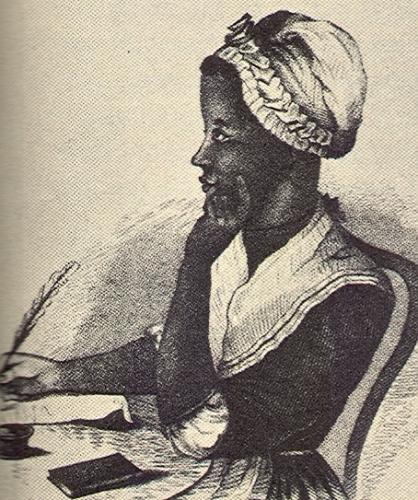 |
LITR 4231 Early American
Literature Sample Research Posts 2014 (research post assignment) Research Post 2 |
 |
Ana Harms
22 April 2014
Mr. & Mrs. John Adams
John and Abigail Adams’ family were referred to as the “Adams political
family.” The Adams were involved
with the founding of the United States, along with being very active in politics
for years to come. Their
influence reached many different people.
John Adams was the first Vice President and the second President of the
United States of America. Abigail
Adams was an advocate for Woman’s Rights. As her husband was assisting with the
writing of the Declaration of Independence, she was able to see firsthand how
women were left out and felt inclined to see that women were recognized as
equals. John and Abigail’s
relationship was documented by a series of letters that were saved.
The letters give us an understanding to their relationship and have become more
than just letters—they have become literature.
These letters allow for us to experience firsthand what took place
between not only John and Abigail, but also our country.
There are over 1,100 letters that were written between the two, and by
reading these letters, it gives us in insight of what their world was like.
In the Letters of Abigail and John
Adams on the Declaration of Independence and Woman’s Rights she states “And,
by the way, in the new code of laws which I suppose it will be necessary for you
to make, I desire you would remember the
ladies and be more generous and favorable to them than your ancestors.”
This particular letter is very informal; she is calling out her husband
and telling him, hey women count too.
This letter is one of her most famous letters, because it is the
beginning of the Women’s rights movement.
She states “if particular care and attention is not paid to the ladies,
we are determined to foment a rebellion, and will not hold ourselves bound by
any laws in which we have no voice or representation.” Her statement sounds more
like a threat; she wanted him to know how serious she was. This letter was very
straightforward and she lets John know exactly how she was feeling.
Their relationship was very honest and candid and it shows that here.
John responds to her with “As to your extraordinary code of laws, I
cannot but laugh.” He goes on to
write how they are trying to make everyone happy and with that, they are losing
some control over different groups.
He does say that he hears her but it is out of his control “We know better than
to repeal our masculine systems.”
This makes her a little mad that she is not taken seriously and his fellow men
are more important. She then responds with “But you must remember that arbitrary
power is like most other things which are very hard, very liable to be broken;
and, notwithstanding all your wise law and maxims, we have it in our power not
only to free ourselves, but to subdue our master and without violence, throw
both your natural and legal authority at our feet.”
Here she’s almost threatening and saying, with or without you, we will
get what we deserve. In this quote
it shows how brave she was for her time.
Woman were not very outspoken and especially not with their husbands.
Even though she felt unheard, she stood by her husband and during his
Presidency she was his number one advisor, she never wavered from their
marriage.
But John and Abigail had a different type of relationship; one that you might
not think existed in the 1700’s. In
the letters it shows how close their relationship was. They always started with
“My Dearest Friend.” I feel like they had a mutual respect for each other as
people as well as husband and wife.
Their intimacy cannot be missed, even when they were talking about politics.
For example in a letter to Abigail, John responds to her, about her
mention of “remember the ladies”, he states “but you are so saucy.”
He was very playful with her even when they were being serious.
He speaks to her as if he is her equal, and that was not common back
then.
One friendship that was shared between both John and Abigail is the friendship
of Thomas Jefferson. There are a
series of letters from John and Abigail that discussed Jefferson. Abigail was
very curious about him, and asked about him quite often.
The friendship between John and Jefferson grew as they were together at
the Continental Congress in Philadelphia, and even though they didn’t always
agree politically, both families became good friends.
They became close when both families were sent to France for diplomatic
service. Abigail and Jefferson even
exchanged a few letters after she returned to Massachusetts. In
Letters by Abigail and John Adams on
Benjamin Franklin, Abigail speaks of the first time meeting Jefferson and
describes him as “social but not talkative,” ”grave yet pleasant and affable” she
admired Jefferson from the beginning and thought him a good Christian man. And
that friendship was severed when Jefferson went against Adams in his second term
candidacy for Presidency. There
were some harsh words said from Jefferson’s party that cut that tie.
When Jefferson won that Presidency, they became enemies, but later
reconciled their friendship, and stayed good friend until their deaths.
John and Abigail Adams relationship is one to be admired, even today.
Their openness and intimacy was uncommon in their time.
Their relationship was special and without the letters that were
preserved, we would never have been able to read about them personally and
politically two hundred years later. I’m not sure if this was John Adams's
intentions when he decided to bind his letters but as for history's sake I’m
glad that he did. I think this is
leaving a legacy at its finest.
Work cited:
http://www.monticello.org/site/jefferson/john-adams
http://www.masshist.org/digitaladams/archive/index
“Letters of Abigail and John Adams on the Declaration of Independence and
Women’s Rights”--On Professor White class website
“Letters by Abigail and John Adams on Benjamin Franklin” -- On Professor White
class website
“Letter of John Adams on hearing a Southern Preacher-- On Professor White class
website
|
|
|
|

